The Psychotic Effects of Sleeping Tablets: A Comprehensive Report
VerifiedAdded on 2020/10/05
|8
|2564
|187
Report
AI Summary
This report investigates the psychotic effects of sleeping tablets, focusing on Zopiclone (Z-class drugs) and Temazepam (B Benzodiazepine drugs). The study highlights various side effects, including delirium, depression, anxiety, and hallucinations, which can result from the use and abuse of these medications. The report examines the impact of sleeping pills, including the development of tolerance, and the potential for psychotic episodes. It also examines the effects of different types of sleeping pills and their impact on brain function, including the occurrence of hallucinations, paranoia, and other mental health issues. The report concludes that the use of sleeping pills can result in several psychotic impacts, depending on dosage and duration. It emphasizes the importance of taking sleeping tablets as per doctor's prescription to avoid severe health issues and drug addiction.
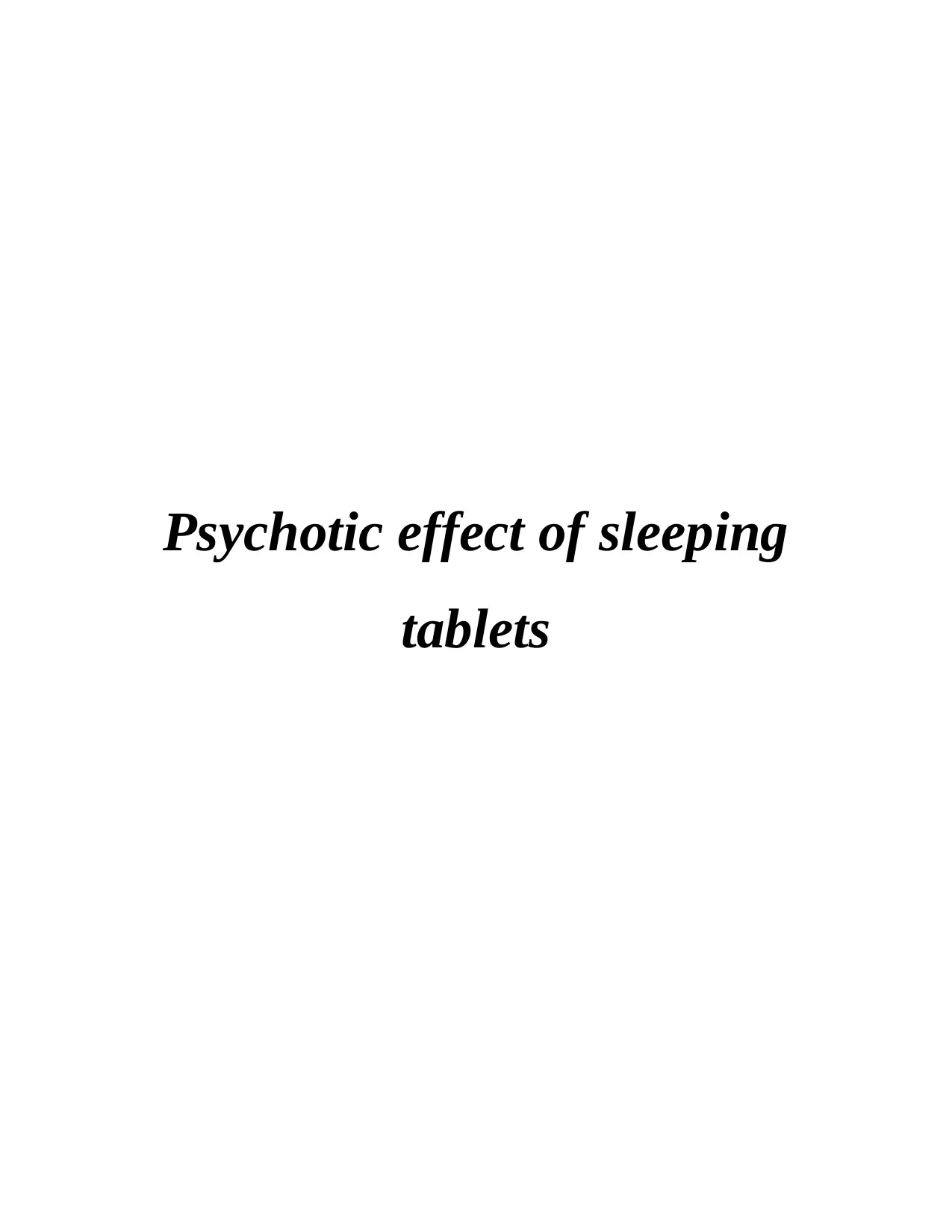
Psychotic effect of sleeping
tablets
tablets
Paraphrase This Document
Need a fresh take? Get an instant paraphrase of this document with our AI Paraphraser
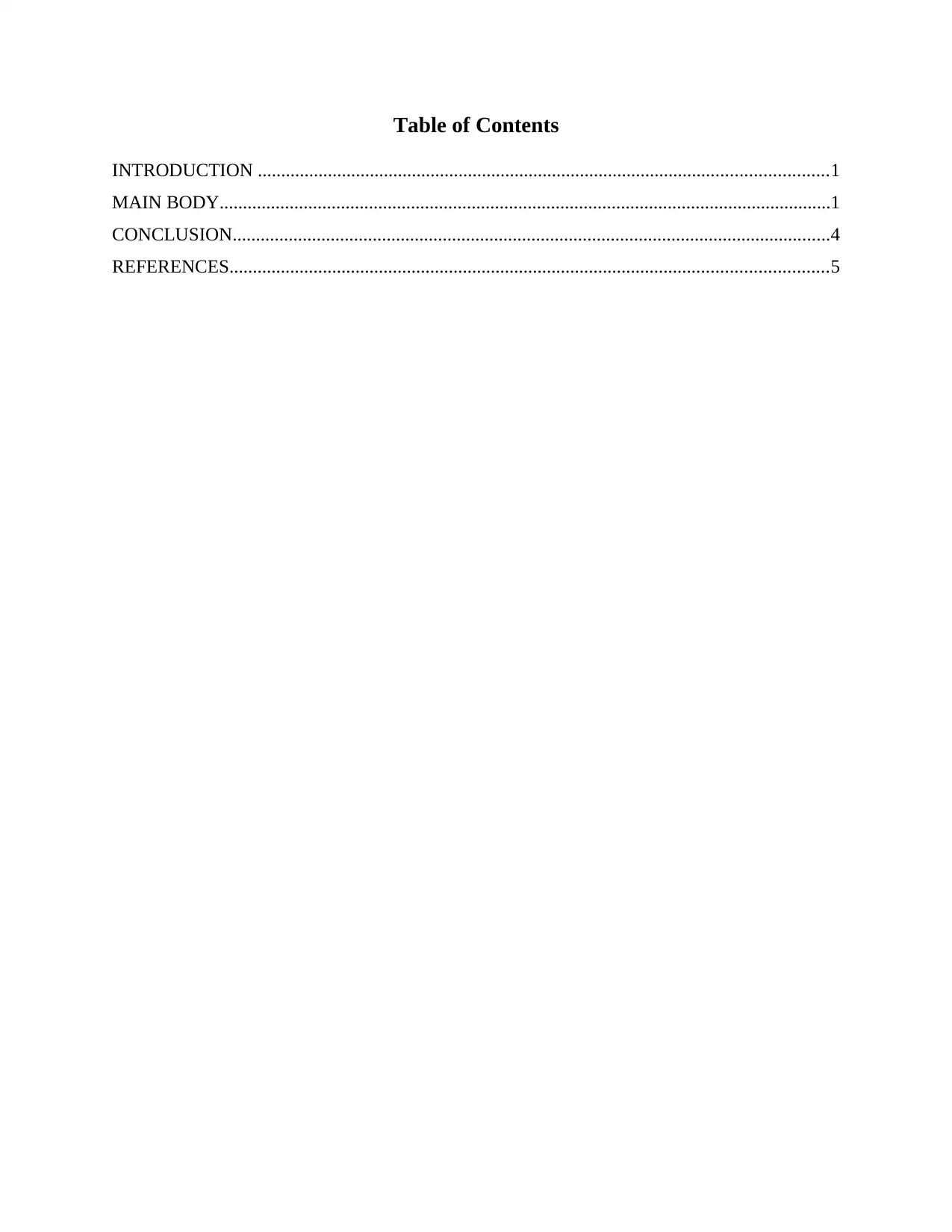
Table of Contents
INTRODUCTION ..........................................................................................................................1
MAIN BODY...................................................................................................................................1
CONCLUSION................................................................................................................................4
REFERENCES................................................................................................................................5
INTRODUCTION ..........................................................................................................................1
MAIN BODY...................................................................................................................................1
CONCLUSION................................................................................................................................4
REFERENCES................................................................................................................................5
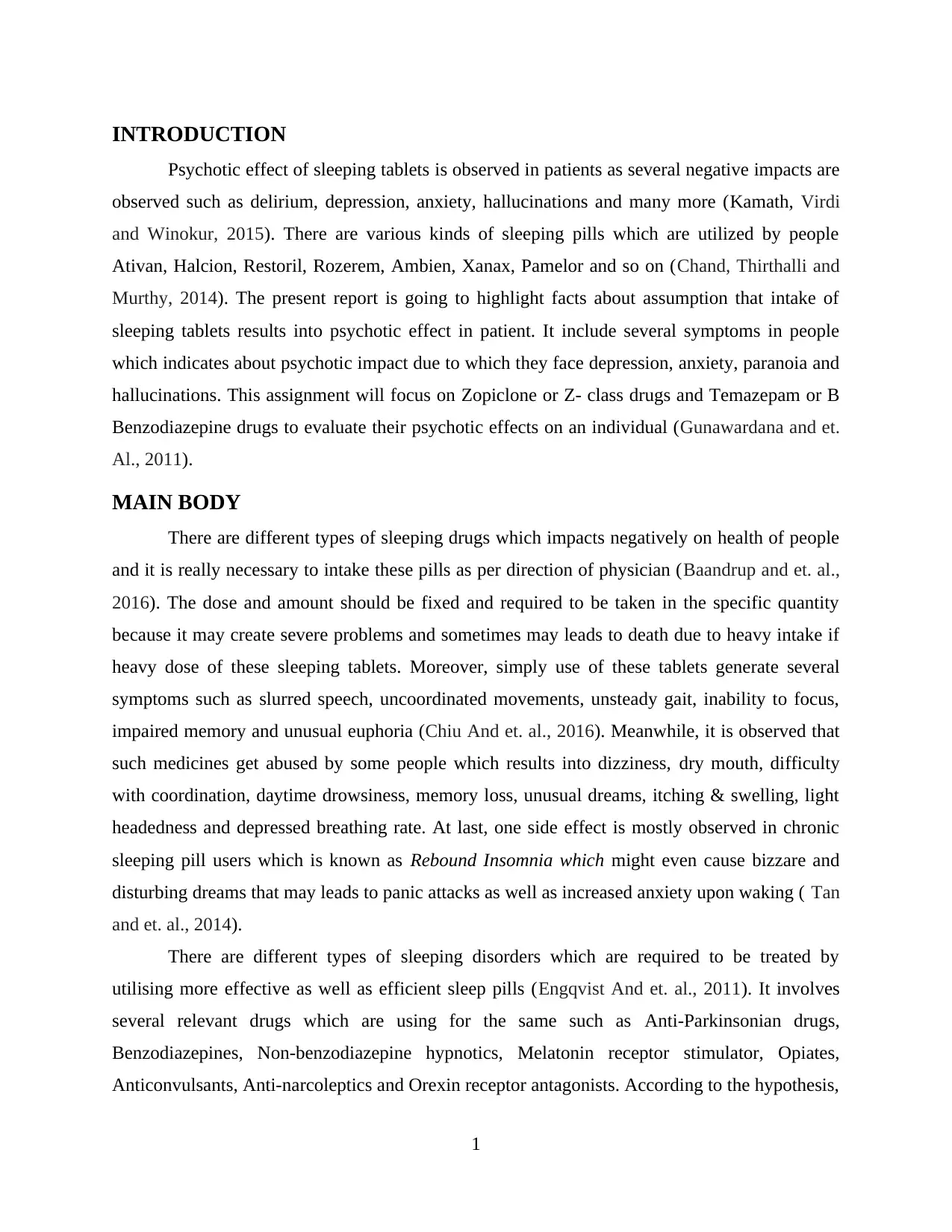
INTRODUCTION
Psychotic effect of sleeping tablets is observed in patients as several negative impacts are
observed such as delirium, depression, anxiety, hallucinations and many more (Kamath, Virdi
and Winokur, 2015). There are various kinds of sleeping pills which are utilized by people
Ativan, Halcion, Restoril, Rozerem, Ambien, Xanax, Pamelor and so on (Chand, Thirthalli and
Murthy, 2014). The present report is going to highlight facts about assumption that intake of
sleeping tablets results into psychotic effect in patient. It include several symptoms in people
which indicates about psychotic impact due to which they face depression, anxiety, paranoia and
hallucinations. This assignment will focus on Zopiclone or Z- class drugs and Temazepam or B
Benzodiazepine drugs to evaluate their psychotic effects on an individual (Gunawardana and et.
Al., 2011).
MAIN BODY
There are different types of sleeping drugs which impacts negatively on health of people
and it is really necessary to intake these pills as per direction of physician (Baandrup and et. al.,
2016). The dose and amount should be fixed and required to be taken in the specific quantity
because it may create severe problems and sometimes may leads to death due to heavy intake if
heavy dose of these sleeping tablets. Moreover, simply use of these tablets generate several
symptoms such as slurred speech, uncoordinated movements, unsteady gait, inability to focus,
impaired memory and unusual euphoria (Chiu And et. al., 2016). Meanwhile, it is observed that
such medicines get abused by some people which results into dizziness, dry mouth, difficulty
with coordination, daytime drowsiness, memory loss, unusual dreams, itching & swelling, light
headedness and depressed breathing rate. At last, one side effect is mostly observed in chronic
sleeping pill users which is known as Rebound Insomnia which might even cause bizzare and
disturbing dreams that may leads to panic attacks as well as increased anxiety upon waking ( Tan
and et. al., 2014).
There are different types of sleeping disorders which are required to be treated by
utilising more effective as well as efficient sleep pills (Engqvist And et. al., 2011). It involves
several relevant drugs which are using for the same such as Anti-Parkinsonian drugs,
Benzodiazepines, Non-benzodiazepine hypnotics, Melatonin receptor stimulator, Opiates,
Anticonvulsants, Anti-narcoleptics and Orexin receptor antagonists. According to the hypothesis,
1
Psychotic effect of sleeping tablets is observed in patients as several negative impacts are
observed such as delirium, depression, anxiety, hallucinations and many more (Kamath, Virdi
and Winokur, 2015). There are various kinds of sleeping pills which are utilized by people
Ativan, Halcion, Restoril, Rozerem, Ambien, Xanax, Pamelor and so on (Chand, Thirthalli and
Murthy, 2014). The present report is going to highlight facts about assumption that intake of
sleeping tablets results into psychotic effect in patient. It include several symptoms in people
which indicates about psychotic impact due to which they face depression, anxiety, paranoia and
hallucinations. This assignment will focus on Zopiclone or Z- class drugs and Temazepam or B
Benzodiazepine drugs to evaluate their psychotic effects on an individual (Gunawardana and et.
Al., 2011).
MAIN BODY
There are different types of sleeping drugs which impacts negatively on health of people
and it is really necessary to intake these pills as per direction of physician (Baandrup and et. al.,
2016). The dose and amount should be fixed and required to be taken in the specific quantity
because it may create severe problems and sometimes may leads to death due to heavy intake if
heavy dose of these sleeping tablets. Moreover, simply use of these tablets generate several
symptoms such as slurred speech, uncoordinated movements, unsteady gait, inability to focus,
impaired memory and unusual euphoria (Chiu And et. al., 2016). Meanwhile, it is observed that
such medicines get abused by some people which results into dizziness, dry mouth, difficulty
with coordination, daytime drowsiness, memory loss, unusual dreams, itching & swelling, light
headedness and depressed breathing rate. At last, one side effect is mostly observed in chronic
sleeping pill users which is known as Rebound Insomnia which might even cause bizzare and
disturbing dreams that may leads to panic attacks as well as increased anxiety upon waking ( Tan
and et. al., 2014).
There are different types of sleeping disorders which are required to be treated by
utilising more effective as well as efficient sleep pills (Engqvist And et. al., 2011). It involves
several relevant drugs which are using for the same such as Anti-Parkinsonian drugs,
Benzodiazepines, Non-benzodiazepine hypnotics, Melatonin receptor stimulator, Opiates,
Anticonvulsants, Anti-narcoleptics and Orexin receptor antagonists. According to the hypothesis,
1
⊘ This is a preview!⊘
Do you want full access?
Subscribe today to unlock all pages.

Trusted by 1+ million students worldwide
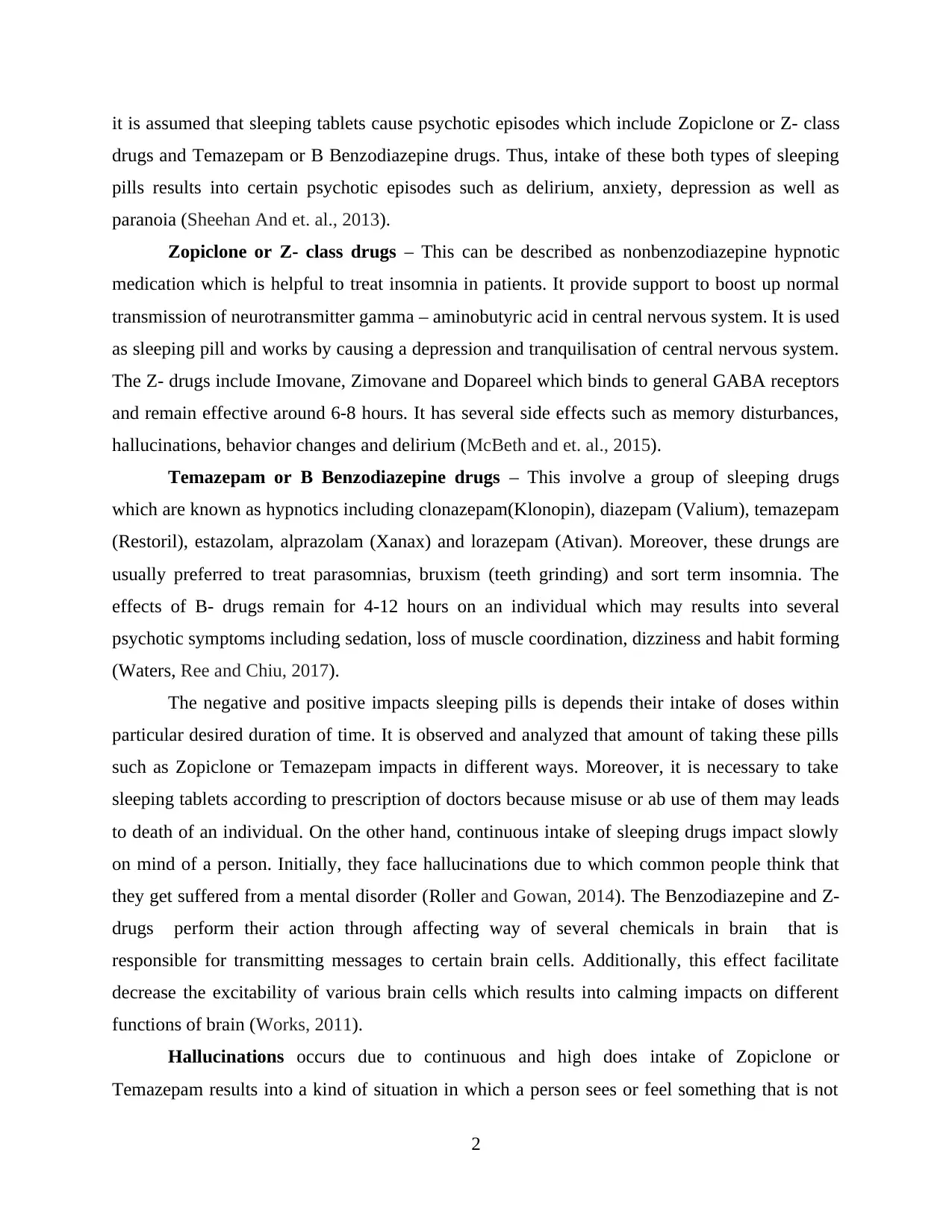
it is assumed that sleeping tablets cause psychotic episodes which include Zopiclone or Z- class
drugs and Temazepam or B Benzodiazepine drugs. Thus, intake of these both types of sleeping
pills results into certain psychotic episodes such as delirium, anxiety, depression as well as
paranoia (Sheehan And et. al., 2013).
Zopiclone or Z- class drugs – This can be described as nonbenzodiazepine hypnotic
medication which is helpful to treat insomnia in patients. It provide support to boost up normal
transmission of neurotransmitter gamma – aminobutyric acid in central nervous system. It is used
as sleeping pill and works by causing a depression and tranquilisation of central nervous system.
The Z- drugs include Imovane, Zimovane and Dopareel which binds to general GABA receptors
and remain effective around 6-8 hours. It has several side effects such as memory disturbances,
hallucinations, behavior changes and delirium (McBeth and et. al., 2015).
Temazepam or B Benzodiazepine drugs – This involve a group of sleeping drugs
which are known as hypnotics including clonazepam(Klonopin), diazepam (Valium), temazepam
(Restoril), estazolam, alprazolam (Xanax) and lorazepam (Ativan). Moreover, these drungs are
usually preferred to treat parasomnias, bruxism (teeth grinding) and sort term insomnia. The
effects of B- drugs remain for 4-12 hours on an individual which may results into several
psychotic symptoms including sedation, loss of muscle coordination, dizziness and habit forming
(Waters, Ree and Chiu, 2017).
The negative and positive impacts sleeping pills is depends their intake of doses within
particular desired duration of time. It is observed and analyzed that amount of taking these pills
such as Zopiclone or Temazepam impacts in different ways. Moreover, it is necessary to take
sleeping tablets according to prescription of doctors because misuse or ab use of them may leads
to death of an individual. On the other hand, continuous intake of sleeping drugs impact slowly
on mind of a person. Initially, they face hallucinations due to which common people think that
they get suffered from a mental disorder (Roller and Gowan, 2014). The Benzodiazepine and Z-
drugs perform their action through affecting way of several chemicals in brain that is
responsible for transmitting messages to certain brain cells. Additionally, this effect facilitate
decrease the excitability of various brain cells which results into calming impacts on different
functions of brain (Works, 2011).
Hallucinations occurs due to continuous and high does intake of Zopiclone or
Temazepam results into a kind of situation in which a person sees or feel something that is not
2
drugs and Temazepam or B Benzodiazepine drugs. Thus, intake of these both types of sleeping
pills results into certain psychotic episodes such as delirium, anxiety, depression as well as
paranoia (Sheehan And et. al., 2013).
Zopiclone or Z- class drugs – This can be described as nonbenzodiazepine hypnotic
medication which is helpful to treat insomnia in patients. It provide support to boost up normal
transmission of neurotransmitter gamma – aminobutyric acid in central nervous system. It is used
as sleeping pill and works by causing a depression and tranquilisation of central nervous system.
The Z- drugs include Imovane, Zimovane and Dopareel which binds to general GABA receptors
and remain effective around 6-8 hours. It has several side effects such as memory disturbances,
hallucinations, behavior changes and delirium (McBeth and et. al., 2015).
Temazepam or B Benzodiazepine drugs – This involve a group of sleeping drugs
which are known as hypnotics including clonazepam(Klonopin), diazepam (Valium), temazepam
(Restoril), estazolam, alprazolam (Xanax) and lorazepam (Ativan). Moreover, these drungs are
usually preferred to treat parasomnias, bruxism (teeth grinding) and sort term insomnia. The
effects of B- drugs remain for 4-12 hours on an individual which may results into several
psychotic symptoms including sedation, loss of muscle coordination, dizziness and habit forming
(Waters, Ree and Chiu, 2017).
The negative and positive impacts sleeping pills is depends their intake of doses within
particular desired duration of time. It is observed and analyzed that amount of taking these pills
such as Zopiclone or Temazepam impacts in different ways. Moreover, it is necessary to take
sleeping tablets according to prescription of doctors because misuse or ab use of them may leads
to death of an individual. On the other hand, continuous intake of sleeping drugs impact slowly
on mind of a person. Initially, they face hallucinations due to which common people think that
they get suffered from a mental disorder (Roller and Gowan, 2014). The Benzodiazepine and Z-
drugs perform their action through affecting way of several chemicals in brain that is
responsible for transmitting messages to certain brain cells. Additionally, this effect facilitate
decrease the excitability of various brain cells which results into calming impacts on different
functions of brain (Works, 2011).
Hallucinations occurs due to continuous and high does intake of Zopiclone or
Temazepam results into a kind of situation in which a person sees or feel something that is not
2
Paraphrase This Document
Need a fresh take? Get an instant paraphrase of this document with our AI Paraphraser
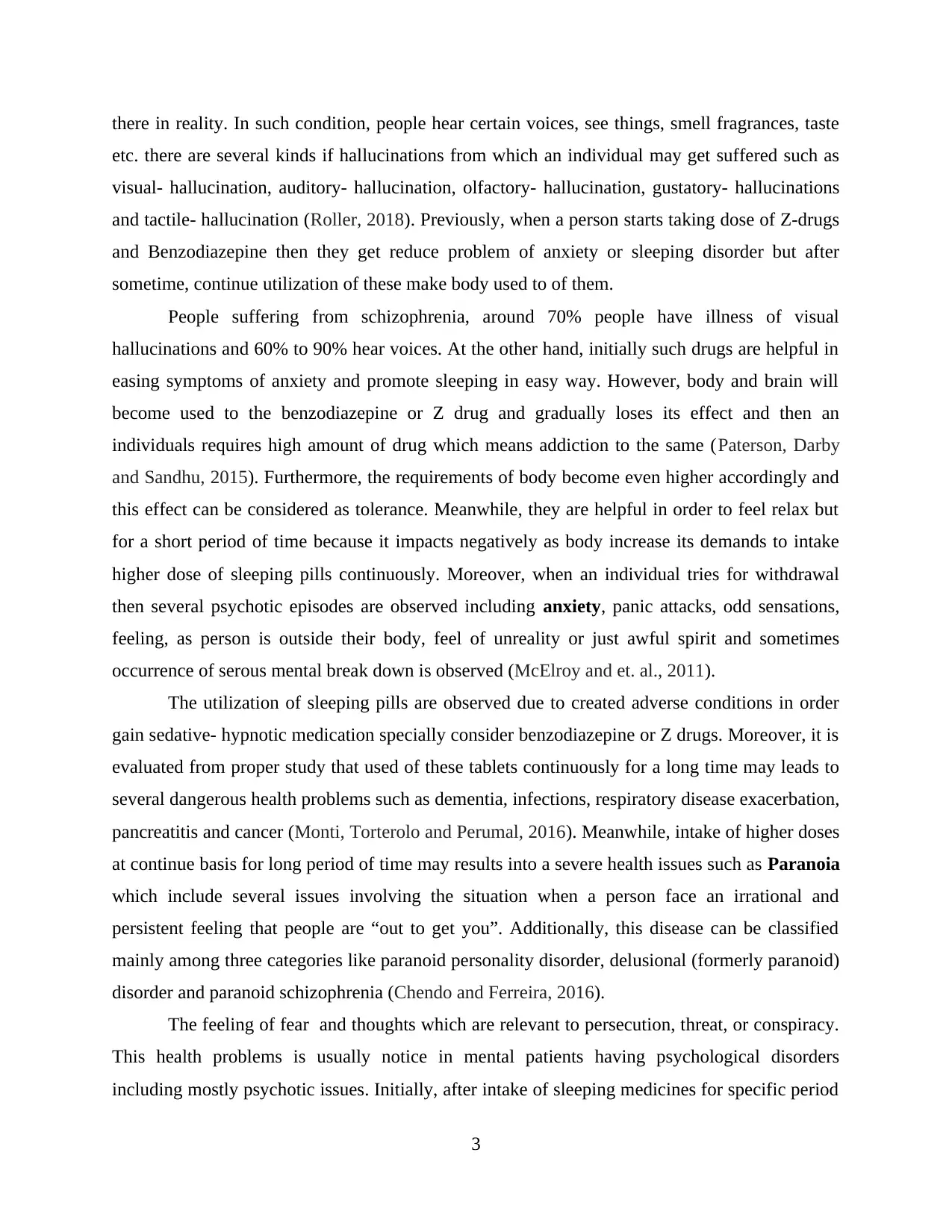
there in reality. In such condition, people hear certain voices, see things, smell fragrances, taste
etc. there are several kinds if hallucinations from which an individual may get suffered such as
visual- hallucination, auditory- hallucination, olfactory- hallucination, gustatory- hallucinations
and tactile- hallucination (Roller, 2018). Previously, when a person starts taking dose of Z-drugs
and Benzodiazepine then they get reduce problem of anxiety or sleeping disorder but after
sometime, continue utilization of these make body used to of them.
People suffering from schizophrenia, around 70% people have illness of visual
hallucinations and 60% to 90% hear voices. At the other hand, initially such drugs are helpful in
easing symptoms of anxiety and promote sleeping in easy way. However, body and brain will
become used to the benzodiazepine or Z drug and gradually loses its effect and then an
individuals requires high amount of drug which means addiction to the same (Paterson, Darby
and Sandhu, 2015). Furthermore, the requirements of body become even higher accordingly and
this effect can be considered as tolerance. Meanwhile, they are helpful in order to feel relax but
for a short period of time because it impacts negatively as body increase its demands to intake
higher dose of sleeping pills continuously. Moreover, when an individual tries for withdrawal
then several psychotic episodes are observed including anxiety, panic attacks, odd sensations,
feeling, as person is outside their body, feel of unreality or just awful spirit and sometimes
occurrence of serous mental break down is observed (McElroy and et. al., 2011).
The utilization of sleeping pills are observed due to created adverse conditions in order
gain sedative- hypnotic medication specially consider benzodiazepine or Z drugs. Moreover, it is
evaluated from proper study that used of these tablets continuously for a long time may leads to
several dangerous health problems such as dementia, infections, respiratory disease exacerbation,
pancreatitis and cancer (Monti, Torterolo and Perumal, 2016). Meanwhile, intake of higher doses
at continue basis for long period of time may results into a severe health issues such as Paranoia
which include several issues involving the situation when a person face an irrational and
persistent feeling that people are “out to get you”. Additionally, this disease can be classified
mainly among three categories like paranoid personality disorder, delusional (formerly paranoid)
disorder and paranoid schizophrenia (Chendo and Ferreira, 2016).
The feeling of fear and thoughts which are relevant to persecution, threat, or conspiracy.
This health problems is usually notice in mental patients having psychological disorders
including mostly psychotic issues. Initially, after intake of sleeping medicines for specific period
3
etc. there are several kinds if hallucinations from which an individual may get suffered such as
visual- hallucination, auditory- hallucination, olfactory- hallucination, gustatory- hallucinations
and tactile- hallucination (Roller, 2018). Previously, when a person starts taking dose of Z-drugs
and Benzodiazepine then they get reduce problem of anxiety or sleeping disorder but after
sometime, continue utilization of these make body used to of them.
People suffering from schizophrenia, around 70% people have illness of visual
hallucinations and 60% to 90% hear voices. At the other hand, initially such drugs are helpful in
easing symptoms of anxiety and promote sleeping in easy way. However, body and brain will
become used to the benzodiazepine or Z drug and gradually loses its effect and then an
individuals requires high amount of drug which means addiction to the same (Paterson, Darby
and Sandhu, 2015). Furthermore, the requirements of body become even higher accordingly and
this effect can be considered as tolerance. Meanwhile, they are helpful in order to feel relax but
for a short period of time because it impacts negatively as body increase its demands to intake
higher dose of sleeping pills continuously. Moreover, when an individual tries for withdrawal
then several psychotic episodes are observed including anxiety, panic attacks, odd sensations,
feeling, as person is outside their body, feel of unreality or just awful spirit and sometimes
occurrence of serous mental break down is observed (McElroy and et. al., 2011).
The utilization of sleeping pills are observed due to created adverse conditions in order
gain sedative- hypnotic medication specially consider benzodiazepine or Z drugs. Moreover, it is
evaluated from proper study that used of these tablets continuously for a long time may leads to
several dangerous health problems such as dementia, infections, respiratory disease exacerbation,
pancreatitis and cancer (Monti, Torterolo and Perumal, 2016). Meanwhile, intake of higher doses
at continue basis for long period of time may results into a severe health issues such as Paranoia
which include several issues involving the situation when a person face an irrational and
persistent feeling that people are “out to get you”. Additionally, this disease can be classified
mainly among three categories like paranoid personality disorder, delusional (formerly paranoid)
disorder and paranoid schizophrenia (Chendo and Ferreira, 2016).
The feeling of fear and thoughts which are relevant to persecution, threat, or conspiracy.
This health problems is usually notice in mental patients having psychological disorders
including mostly psychotic issues. Initially, after intake of sleeping medicines for specific period
3
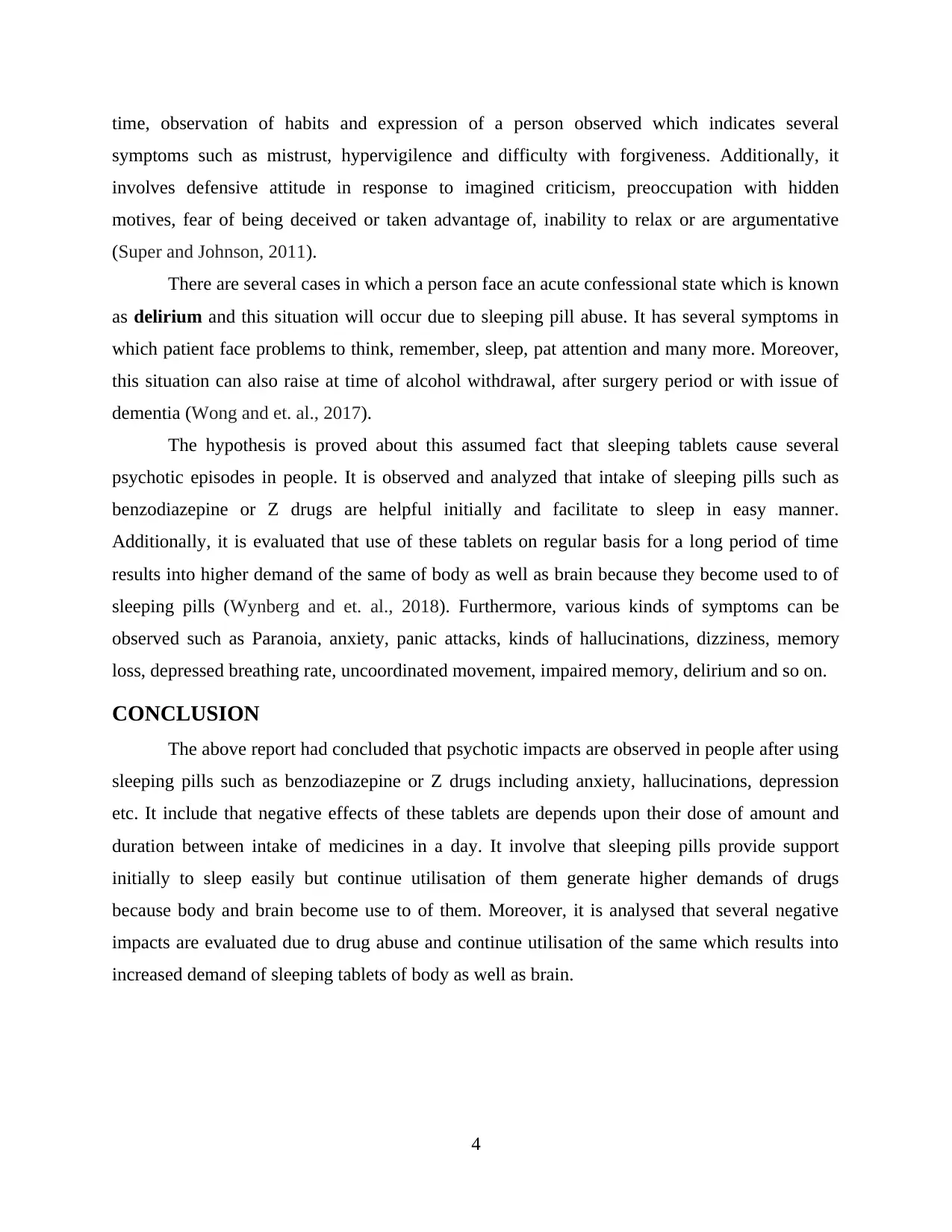
time, observation of habits and expression of a person observed which indicates several
symptoms such as mistrust, hypervigilence and difficulty with forgiveness. Additionally, it
involves defensive attitude in response to imagined criticism, preoccupation with hidden
motives, fear of being deceived or taken advantage of, inability to relax or are argumentative
(Super and Johnson, 2011).
There are several cases in which a person face an acute confessional state which is known
as delirium and this situation will occur due to sleeping pill abuse. It has several symptoms in
which patient face problems to think, remember, sleep, pat attention and many more. Moreover,
this situation can also raise at time of alcohol withdrawal, after surgery period or with issue of
dementia (Wong and et. al., 2017).
The hypothesis is proved about this assumed fact that sleeping tablets cause several
psychotic episodes in people. It is observed and analyzed that intake of sleeping pills such as
benzodiazepine or Z drugs are helpful initially and facilitate to sleep in easy manner.
Additionally, it is evaluated that use of these tablets on regular basis for a long period of time
results into higher demand of the same of body as well as brain because they become used to of
sleeping pills (Wynberg and et. al., 2018). Furthermore, various kinds of symptoms can be
observed such as Paranoia, anxiety, panic attacks, kinds of hallucinations, dizziness, memory
loss, depressed breathing rate, uncoordinated movement, impaired memory, delirium and so on.
CONCLUSION
The above report had concluded that psychotic impacts are observed in people after using
sleeping pills such as benzodiazepine or Z drugs including anxiety, hallucinations, depression
etc. It include that negative effects of these tablets are depends upon their dose of amount and
duration between intake of medicines in a day. It involve that sleeping pills provide support
initially to sleep easily but continue utilisation of them generate higher demands of drugs
because body and brain become use to of them. Moreover, it is analysed that several negative
impacts are evaluated due to drug abuse and continue utilisation of the same which results into
increased demand of sleeping tablets of body as well as brain.
4
symptoms such as mistrust, hypervigilence and difficulty with forgiveness. Additionally, it
involves defensive attitude in response to imagined criticism, preoccupation with hidden
motives, fear of being deceived or taken advantage of, inability to relax or are argumentative
(Super and Johnson, 2011).
There are several cases in which a person face an acute confessional state which is known
as delirium and this situation will occur due to sleeping pill abuse. It has several symptoms in
which patient face problems to think, remember, sleep, pat attention and many more. Moreover,
this situation can also raise at time of alcohol withdrawal, after surgery period or with issue of
dementia (Wong and et. al., 2017).
The hypothesis is proved about this assumed fact that sleeping tablets cause several
psychotic episodes in people. It is observed and analyzed that intake of sleeping pills such as
benzodiazepine or Z drugs are helpful initially and facilitate to sleep in easy manner.
Additionally, it is evaluated that use of these tablets on regular basis for a long period of time
results into higher demand of the same of body as well as brain because they become used to of
sleeping pills (Wynberg and et. al., 2018). Furthermore, various kinds of symptoms can be
observed such as Paranoia, anxiety, panic attacks, kinds of hallucinations, dizziness, memory
loss, depressed breathing rate, uncoordinated movement, impaired memory, delirium and so on.
CONCLUSION
The above report had concluded that psychotic impacts are observed in people after using
sleeping pills such as benzodiazepine or Z drugs including anxiety, hallucinations, depression
etc. It include that negative effects of these tablets are depends upon their dose of amount and
duration between intake of medicines in a day. It involve that sleeping pills provide support
initially to sleep easily but continue utilisation of them generate higher demands of drugs
because body and brain become use to of them. Moreover, it is analysed that several negative
impacts are evaluated due to drug abuse and continue utilisation of the same which results into
increased demand of sleeping tablets of body as well as brain.
4
⊘ This is a preview!⊘
Do you want full access?
Subscribe today to unlock all pages.

Trusted by 1+ million students worldwide
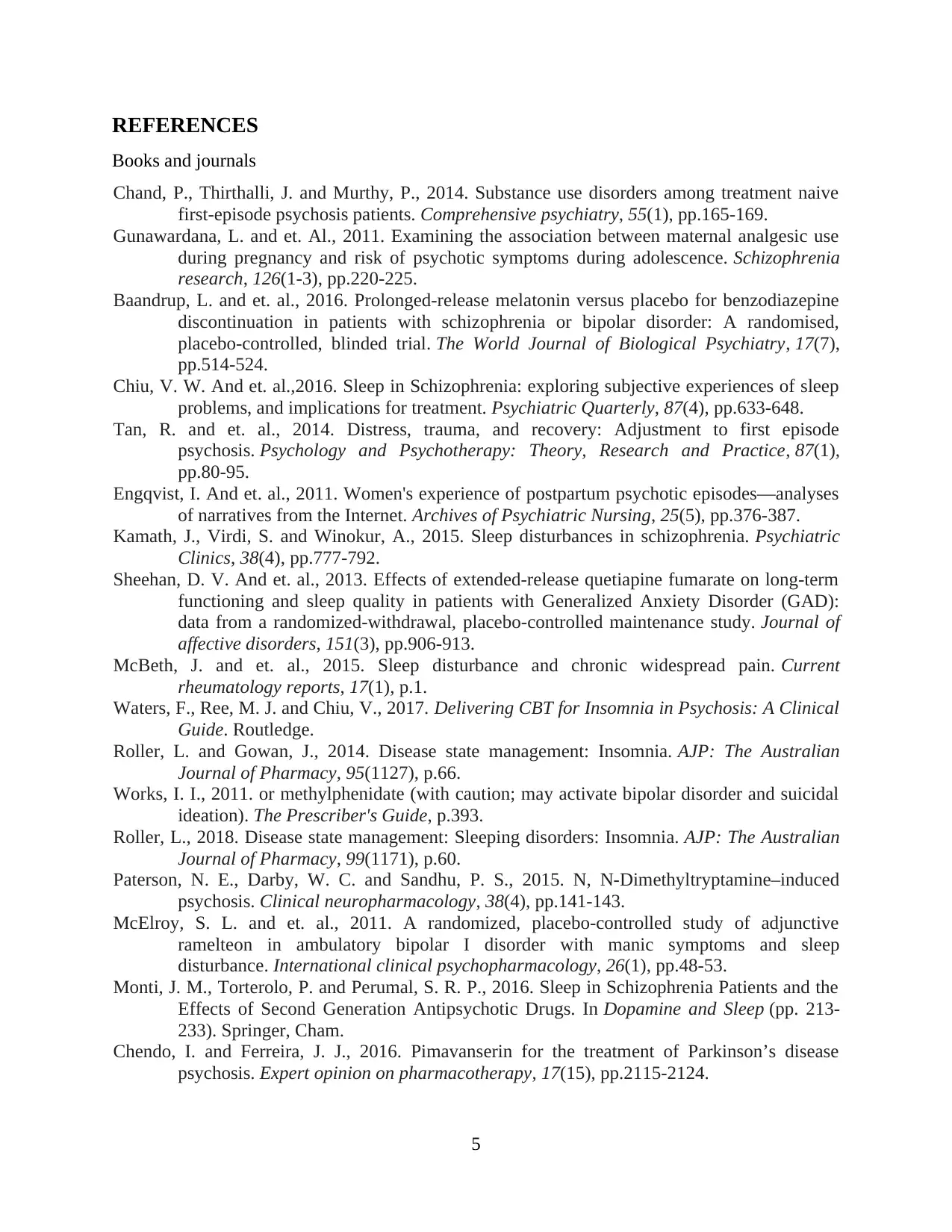
REFERENCES
Books and journals
Chand, P., Thirthalli, J. and Murthy, P., 2014. Substance use disorders among treatment naive
first-episode psychosis patients. Comprehensive psychiatry, 55(1), pp.165-169.
Gunawardana, L. and et. Al., 2011. Examining the association between maternal analgesic use
during pregnancy and risk of psychotic symptoms during adolescence. Schizophrenia
research, 126(1-3), pp.220-225.
Baandrup, L. and et. al., 2016. Prolonged-release melatonin versus placebo for benzodiazepine
discontinuation in patients with schizophrenia or bipolar disorder: A randomised,
placebo-controlled, blinded trial. The World Journal of Biological Psychiatry, 17(7),
pp.514-524.
Chiu, V. W. And et. al.,2016. Sleep in Schizophrenia: exploring subjective experiences of sleep
problems, and implications for treatment. Psychiatric Quarterly, 87(4), pp.633-648.
Tan, R. and et. al., 2014. Distress, trauma, and recovery: Adjustment to first episode
psychosis. Psychology and Psychotherapy: Theory, Research and Practice, 87(1),
pp.80-95.
Engqvist, I. And et. al., 2011. Women's experience of postpartum psychotic episodes—analyses
of narratives from the Internet. Archives of Psychiatric Nursing, 25(5), pp.376-387.
Kamath, J., Virdi, S. and Winokur, A., 2015. Sleep disturbances in schizophrenia. Psychiatric
Clinics, 38(4), pp.777-792.
Sheehan, D. V. And et. al., 2013. Effects of extended-release quetiapine fumarate on long-term
functioning and sleep quality in patients with Generalized Anxiety Disorder (GAD):
data from a randomized-withdrawal, placebo-controlled maintenance study. Journal of
affective disorders, 151(3), pp.906-913.
McBeth, J. and et. al., 2015. Sleep disturbance and chronic widespread pain. Current
rheumatology reports, 17(1), p.1.
Waters, F., Ree, M. J. and Chiu, V., 2017. Delivering CBT for Insomnia in Psychosis: A Clinical
Guide. Routledge.
Roller, L. and Gowan, J., 2014. Disease state management: Insomnia. AJP: The Australian
Journal of Pharmacy, 95(1127), p.66.
Works, I. I., 2011. or methylphenidate (with caution; may activate bipolar disorder and suicidal
ideation). The Prescriber's Guide, p.393.
Roller, L., 2018. Disease state management: Sleeping disorders: Insomnia. AJP: The Australian
Journal of Pharmacy, 99(1171), p.60.
Paterson, N. E., Darby, W. C. and Sandhu, P. S., 2015. N, N-Dimethyltryptamine–induced
psychosis. Clinical neuropharmacology, 38(4), pp.141-143.
McElroy, S. L. and et. al., 2011. A randomized, placebo-controlled study of adjunctive
ramelteon in ambulatory bipolar I disorder with manic symptoms and sleep
disturbance. International clinical psychopharmacology, 26(1), pp.48-53.
Monti, J. M., Torterolo, P. and Perumal, S. R. P., 2016. Sleep in Schizophrenia Patients and the
Effects of Second Generation Antipsychotic Drugs. In Dopamine and Sleep (pp. 213-
233). Springer, Cham.
Chendo, I. and Ferreira, J. J., 2016. Pimavanserin for the treatment of Parkinson’s disease
psychosis. Expert opinion on pharmacotherapy, 17(15), pp.2115-2124.
5
Books and journals
Chand, P., Thirthalli, J. and Murthy, P., 2014. Substance use disorders among treatment naive
first-episode psychosis patients. Comprehensive psychiatry, 55(1), pp.165-169.
Gunawardana, L. and et. Al., 2011. Examining the association between maternal analgesic use
during pregnancy and risk of psychotic symptoms during adolescence. Schizophrenia
research, 126(1-3), pp.220-225.
Baandrup, L. and et. al., 2016. Prolonged-release melatonin versus placebo for benzodiazepine
discontinuation in patients with schizophrenia or bipolar disorder: A randomised,
placebo-controlled, blinded trial. The World Journal of Biological Psychiatry, 17(7),
pp.514-524.
Chiu, V. W. And et. al.,2016. Sleep in Schizophrenia: exploring subjective experiences of sleep
problems, and implications for treatment. Psychiatric Quarterly, 87(4), pp.633-648.
Tan, R. and et. al., 2014. Distress, trauma, and recovery: Adjustment to first episode
psychosis. Psychology and Psychotherapy: Theory, Research and Practice, 87(1),
pp.80-95.
Engqvist, I. And et. al., 2011. Women's experience of postpartum psychotic episodes—analyses
of narratives from the Internet. Archives of Psychiatric Nursing, 25(5), pp.376-387.
Kamath, J., Virdi, S. and Winokur, A., 2015. Sleep disturbances in schizophrenia. Psychiatric
Clinics, 38(4), pp.777-792.
Sheehan, D. V. And et. al., 2013. Effects of extended-release quetiapine fumarate on long-term
functioning and sleep quality in patients with Generalized Anxiety Disorder (GAD):
data from a randomized-withdrawal, placebo-controlled maintenance study. Journal of
affective disorders, 151(3), pp.906-913.
McBeth, J. and et. al., 2015. Sleep disturbance and chronic widespread pain. Current
rheumatology reports, 17(1), p.1.
Waters, F., Ree, M. J. and Chiu, V., 2017. Delivering CBT for Insomnia in Psychosis: A Clinical
Guide. Routledge.
Roller, L. and Gowan, J., 2014. Disease state management: Insomnia. AJP: The Australian
Journal of Pharmacy, 95(1127), p.66.
Works, I. I., 2011. or methylphenidate (with caution; may activate bipolar disorder and suicidal
ideation). The Prescriber's Guide, p.393.
Roller, L., 2018. Disease state management: Sleeping disorders: Insomnia. AJP: The Australian
Journal of Pharmacy, 99(1171), p.60.
Paterson, N. E., Darby, W. C. and Sandhu, P. S., 2015. N, N-Dimethyltryptamine–induced
psychosis. Clinical neuropharmacology, 38(4), pp.141-143.
McElroy, S. L. and et. al., 2011. A randomized, placebo-controlled study of adjunctive
ramelteon in ambulatory bipolar I disorder with manic symptoms and sleep
disturbance. International clinical psychopharmacology, 26(1), pp.48-53.
Monti, J. M., Torterolo, P. and Perumal, S. R. P., 2016. Sleep in Schizophrenia Patients and the
Effects of Second Generation Antipsychotic Drugs. In Dopamine and Sleep (pp. 213-
233). Springer, Cham.
Chendo, I. and Ferreira, J. J., 2016. Pimavanserin for the treatment of Parkinson’s disease
psychosis. Expert opinion on pharmacotherapy, 17(15), pp.2115-2124.
5
Paraphrase This Document
Need a fresh take? Get an instant paraphrase of this document with our AI Paraphraser
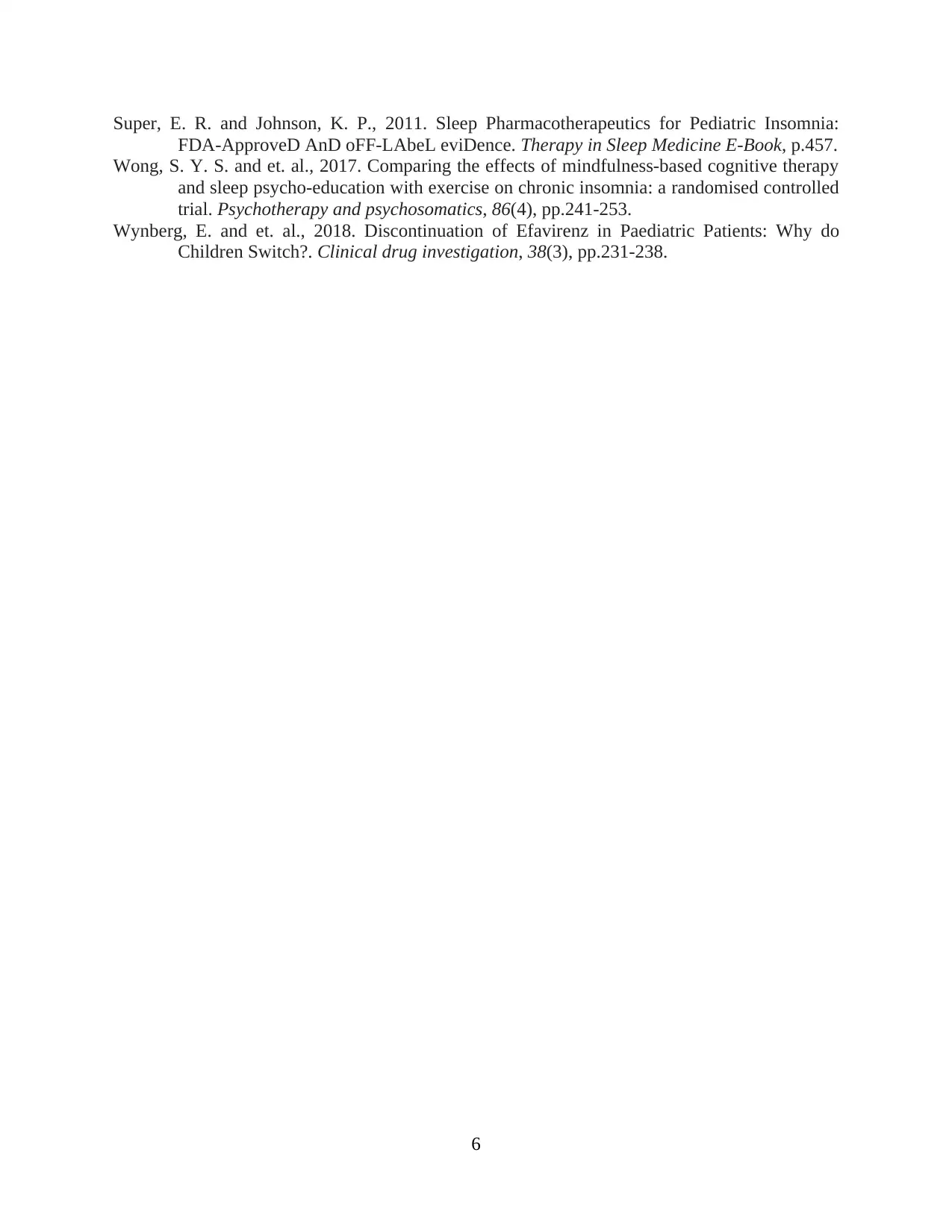
Super, E. R. and Johnson, K. P., 2011. Sleep Pharmacotherapeutics for Pediatric Insomnia:
FDA-ApproveD AnD oFF-LAbeL eviDence. Therapy in Sleep Medicine E-Book, p.457.
Wong, S. Y. S. and et. al., 2017. Comparing the effects of mindfulness-based cognitive therapy
and sleep psycho-education with exercise on chronic insomnia: a randomised controlled
trial. Psychotherapy and psychosomatics, 86(4), pp.241-253.
Wynberg, E. and et. al., 2018. Discontinuation of Efavirenz in Paediatric Patients: Why do
Children Switch?. Clinical drug investigation, 38(3), pp.231-238.
6
FDA-ApproveD AnD oFF-LAbeL eviDence. Therapy in Sleep Medicine E-Book, p.457.
Wong, S. Y. S. and et. al., 2017. Comparing the effects of mindfulness-based cognitive therapy
and sleep psycho-education with exercise on chronic insomnia: a randomised controlled
trial. Psychotherapy and psychosomatics, 86(4), pp.241-253.
Wynberg, E. and et. al., 2018. Discontinuation of Efavirenz in Paediatric Patients: Why do
Children Switch?. Clinical drug investigation, 38(3), pp.231-238.
6
1 out of 8
Related Documents
Your All-in-One AI-Powered Toolkit for Academic Success.
+13062052269
info@desklib.com
Available 24*7 on WhatsApp / Email
![[object Object]](/_next/static/media/star-bottom.7253800d.svg)
Unlock your academic potential
Copyright © 2020–2026 A2Z Services. All Rights Reserved. Developed and managed by ZUCOL.



